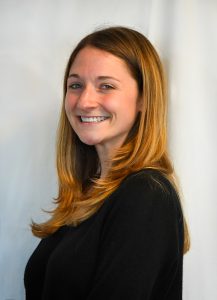By Emily Vohralik

UNSW Women in Maths and Science Champions Program. Kensington Campus. 16 August 2018. Photo by, Peter Rae Copyright UNSW. Photo shows, Jenny Sloane.
After moving halfway across the world from the US to Australia for her PhD, Jenny has found herself immersed in the world of mathematical psychology. She didn’t expect to be living in Sydney coding all day long, but she loves it! Her research aims to understand how time pressure and interruptions affect decisions made by doctors. When she’s not sitting at her computer, Jenny will often be found outdoors soaking up the Aussie sun on a run or bushwalk.
Do you know how many times you’re interrupted during the day? Especially when you’re working on a particularly important task?
I’m sure we all have too many interruptions to count (including almost everything on our phones, friendly chats with colleagues, coffee trips, snack breaks…), but usually we manage to get back on task. The time that it takes for us to pick up where we left off after an interruption is called the resumption time. This is one of the factors Jenny looks at in her work as a mathematical psychology researcher. This small field of research (that I’d never heard of before!) involves using maths modelling to understand mechanisms behind the brain’s processes, such as decision-making.
Now imagine you’ve become very unwell and had to go to the emergency room at a hospital. The doctors are there to help you, but if they’re interrupted during their job, what will be the consequences for you as the patient? It’s normal for emergency doctors to work in this high-pressured environment while dealing with distractions. Jenny’s PhD project is focused on medical decision-making. Currently she is working on multiple experiments to understand the effects of time pressure and interruptions on decision-making in general. Then she hopes to apply this to real-life medical situations, taking advantage of the wealth of data from hospitals and ambulance services that are out there waiting to be analysed.
Something surprising about her research is that Jenny spends most of her days sitting at the computer coding in R, Python, or JavaScript (coding languages). This isn’t where Jenny pictured herself 5 years ago when she didn’t even know how to code! The coding is used to design computer-based experiments from scratch, then Jenny brings in undergrad uni students to do the tests on the computer. Then there’s more coding to analyse the data and make some pretty graphs showing exciting new results.

Jenny’s taking full advantage of her double monitors: analysing data and creating pretty graphs on the left and coding an experiment on the right
Jenny’s science journey began in the US, where she completed a Bachelor of Psychology at the University of Maryland. It was during her second-year experiences working in research labs with cool technologies that Jenny became fascinated with the brain and memory and knew she wanted to pursue a career in research. After her undergraduate degree, Jenny moved to upstate New York where she completed a master’s degree in Experimental Psychology. The research topic was on memory, and this is when she was thrown in the deep end to learn coding from scratch. Jenny said it was a steep learning curve, but after coding almost every day for a year she was finally proficient in these computer-based languages. While completing her master’s, she came across an application at UNSW looking for a PhD student interested in medical decision-making. With a background in memory research and interest in medicine, Jenny said when she heard about this opportunity she knew she had to apply or would regret it for the rest of her life. She said moving to Australia was one of the best decisions she’s made, and that she “looooves Australia”!
When she’s not coding at the computer, Jenny enjoys being outside and goes running along the Coogee-Bondi coastal track almost every weekend to de-stress and refocus. She also spends a lot of time facetiming her family over in the US, especially since her brother and his wife have recently had a baby.
Back in New York during her master’s degree, Jenny was part of WiSE – Women in Science and Engineering. Naturally, here in Sydney she became a UNSW Champion for Women in Maths and Science because she was seeking out another great program to connect her with inspirational female scientists and to promote the value of science to the community through outreach.
Follow Jenny on Twitter (@jfsloane)
Follow Emily on Twitter (@EVohralik)